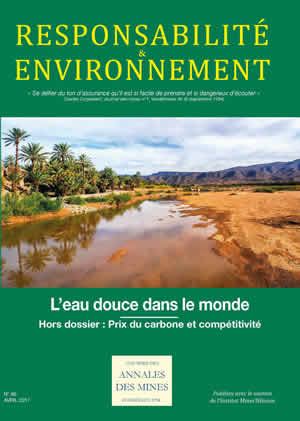 N° 86 - Avril 2017 - L'eau douce dans le monde, comment gérer un bien commun ? N° 86 - Avril 2017 - L'eau douce dans le monde, comment gérer un bien commun ?
Water and Climate Change Policy: A Brief History for Future Progress (1)
By Maggie WHITE and John H. MATTHEWS
Alliance for Global Water Adaptation (AGWA)
Karin LEXÉN and Sofia WIDFORSS
Stockholm International Water Institute (SIWI)
and
Diego J. RODRIGUEZ
The World Bank Group
For most of the water community today, it seems self-evident that sustainable freshwater resource management is critical to tackling climate change. Reducing greenhouse gas emissions through cleaner energy sources, sequestering carbon from the atmosphere, and enabling effective climate-impact adaptive mechanisms for agriculture, ecosystems, cities, and energy systems cannot succeed without taking into account freshwater resources. In turn, it is also understood that many aspects of climate policy have direct impacts on water management decisions, including national and regional energy and water sharing policies, investment and finance strategies for water, and how water projects and their purposes are framed. Historically, water and climate change have been poorly integrated institutionally, partially due to a lack of appreciation by both the climate and water communities of how deeply the two facets are entwined. In truth, much has been accomplished: institutions and roles in both communities have been evolving, and the outline of a new synthesis is emerging. This article describes in three parts how the water community has evolved over the past two decades in its articulation of water-climate policy and its engagement with the climate change community.
(1) This article was initially published by the Global Water Forum, February 2017
 Télécharger gratuitement l'article Télécharger gratuitement l'article
 Retour au sommaire Retour au sommaire
 N° 86 - April 2017 - Fresh water: How to manage a common good? N° 86 - April 2017 - Fresh water: How to manage a common good?
Water and Climate Change Policy: A Brief History for Future Progress
Maggie White and John H. Matthews,
Alliance for Global Water Adaptation (AGWA),
Karin Lexén and Sofia Widforss,
Stockholm International Water Institute (SIWI),
and
Diego J. Rodriguez,
The World Bank Group
For most of the water community today, it seems self-evident that sustainable freshwater resource management is critical to tackling climate change. Reducing greenhouse gas emissions through cleaner energy sources, sequestering carbon from the atmosphere, and enabling effective climate-impact adaptive mechanisms for agriculture, ecosystems, cities, and energy systems cannot succeed without taking into account freshwater resources. In turn, it is also understood that many aspects of climate policy have direct impacts on water management decisions, including national and regional energy and water sharing policies, investment and finance strategies for water, and how water projects and their purposes are framed. Historically, water and climate change have been poorly integrated institutionally, partially due to a lack of appreciation by both the climate and water communities of how deeply the two facets are entwined. In truth, much has been accomplished: institutions and roles in both communities have been evolving, and the outline of a new synthesis is emerging. This article describes in three parts how the water community has evolved over the past two decades in its articulation of water-climate policy and its engagement with the climate change community.
 Retour au sommaire Retour au sommaire
 N° 86 - Abril 2017 - El agua dulce en el mundo, N° 86 - Abril 2017 - El agua dulce en el mundo,
¿Cómo gestionar un bien común?
Water and Climate Change Policy: A Brief History for Future Progress
Maggie White and John H. Matthews,
Alliance for Global Water Adaptation (AGWA),
Karin Lexén and Sofia Widforss,
Stockholm International Water Institute (SIWI),
and
Diego J. Rodriguez,
The World Bank Group
For most of the water community today, it seems self-evident that sustainable freshwater resource management is critical to tackling climate change. Reducing greenhouse gas emissions through cleaner energy sources, sequestering carbon from the atmosphere, and enabling effective climate-impact adaptive mechanisms for agriculture, ecosystems, cities, and energy systems cannot succeed without taking into account freshwater resources. In turn, it is also understood that many aspects of climate policy have direct impacts on water management decisions, including national and regional energy and water sharing policies, investment and finance strategies for water, and how water projects and their purposes are framed. Historically, water and climate change have been poorly integrated institutionally, partially due to a lack of appreciation by both the climate and water communities of how deeply the two facets are entwined. In truth, much has been accomplished: institutions and roles in both communities have been evolving, and the outline of a new synthesis is emerging. This article describes in three parts how the water community has evolved over the past two decades in its articulation of water-climate policy and its engagement with the climate change community.
 Retour au sommaire Retour au sommaire
|




